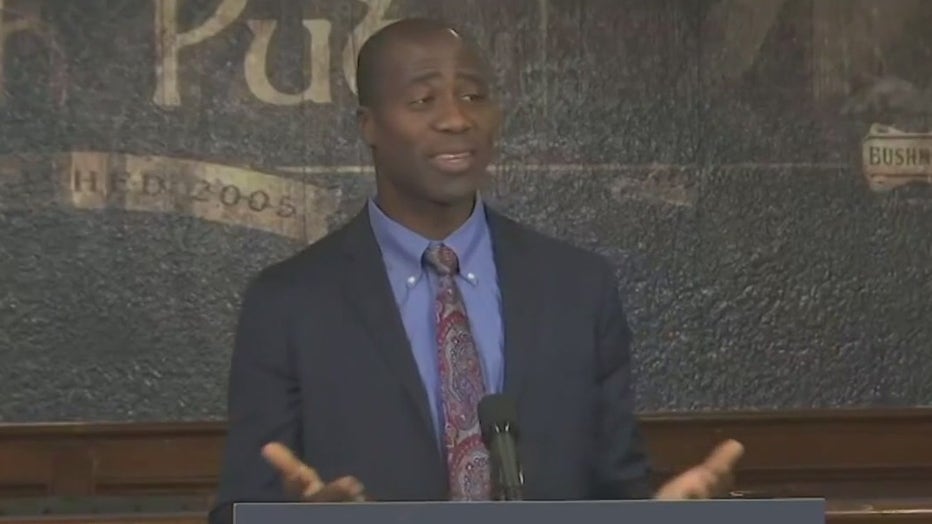Florida Surgeon General calls for halt on mRNA COVID-19 vaccines
TAMPA, Fla. - Florida Surgeon General Dr. Joseph Ladapo called for at least a temporary end to the use of the most common type of COVID-19 vaccines on Wednesday.
In a Tweet Wednesday morning, Ladapo wrote, "I am calling for a halt to the use of mRNA COVID-19 vaccines." He added, in part, "The U.S. Food and Drug Administration and the Centers for Disease Control have always played it fast and loose with COVID-19 vaccine safety."
This continued Ladapo's long history of criticizing the FDA and CDC regarding COVID-19 vaccines.
"We continue to live in a world where the CDC and the FDA, when it comes to COVID at least, are just meeting their own path in a direction that is inexplicable in terms of thinking about data, speaking about common sense," Ladapo said during a virtual roundtable last September.
Dr. Thomas Unnasch, with USF Health's Center for Global Research, said Ladapo's concerns about mRNA vaccines center around speculation that DNA contaminants in the vaccine could combine with human DNA and cause health risks, such as cancer.
Unnasch, however, said the chances of that happening are minute.
"This is like talking about something that's probably a one-in-10 billion or 100 billion chance that something could possibly go wrong," said Unnasch.
Ladapo's Tweet followed a letter he sent to the FDA in December, making the same request to stop mRNA COVID vaccines.

The FDA responded with a two-page letter, writing, in part, ""We would like to make clear that based on a thorough assessment of the entire manufacturing process, FDA is confident in the quality, safety, and effectiveness of the COVID-19 vaccines."
"Have we seen large numbers of people dying from getting RNA vaccines or people getting cancer from RNA vaccines? I would say, 'no,'" said Unnasch. "I say, worldwide, we've just run the largest clinical trial in history on a new treatment. And I would say that it's been shown to be safe and effective by any stretch of the imagination."
In a statement to FOX 13 Wednesday, the FDA reiterated what the agency wrote in its letter to the Florida Department of Health:
"The FDA stands firmly behind the safety, effectiveness and manufacturing quality of the approved and authorized COVID-19 vaccines, and respectfully disagrees with the Florida Surgeon General’s opinion. With over a billion doses of the mRNA vaccines administered and following very careful review of all the available scientific evidence, the FDA has not identified safety concerns related to the sequence of, or amount of, residual DNA. In general, while concerns have been raised previously as theoretical issues, the available scientific evidence regarding the mRNA vaccines strongly supports the conclusion that the vaccines are safe and effective and have a highly favorable profile of benefit to risk. Additionally, it is simply a fact that millions of lives have been saved because of the COVID-19 mRNA vaccines, which most Americans undergoing vaccination have received (Two Years COVID Vaccines Prevented Millions Hospitalizations Deaths | Commonwealth Fund).
Perpetuating references to information about residual DNA in COVID-19 vaccines without placing it within the context of the manufacturing process and the known benefits of the vaccine is misleading. Please refer to FDA’s letter to Dr. Ladapo for an explanation along with references. As stated in the letter, the challenge we continue to face is the ongoing proliferation of misinformation and disinformation about these vaccines which results in vaccine hesitancy that lowers vaccine uptake. Given the dramatic reduction in the risk of death, hospitalization and serious illness afforded by the vaccines, lower vaccine uptake is contributing to the continued death and serious illness toll of COVID-19."
This debate comes as vaccine popularity is on the decline, even as COVID-19 infections are rising.
According to the most recent data from the CDC, there were nearly 30,000 hospitalizations during the week ending December 23. That's the seventh consecutive week of increases and the most since last January.
Only about 14 percent of adults in Florida, however, have received the latest booster.


